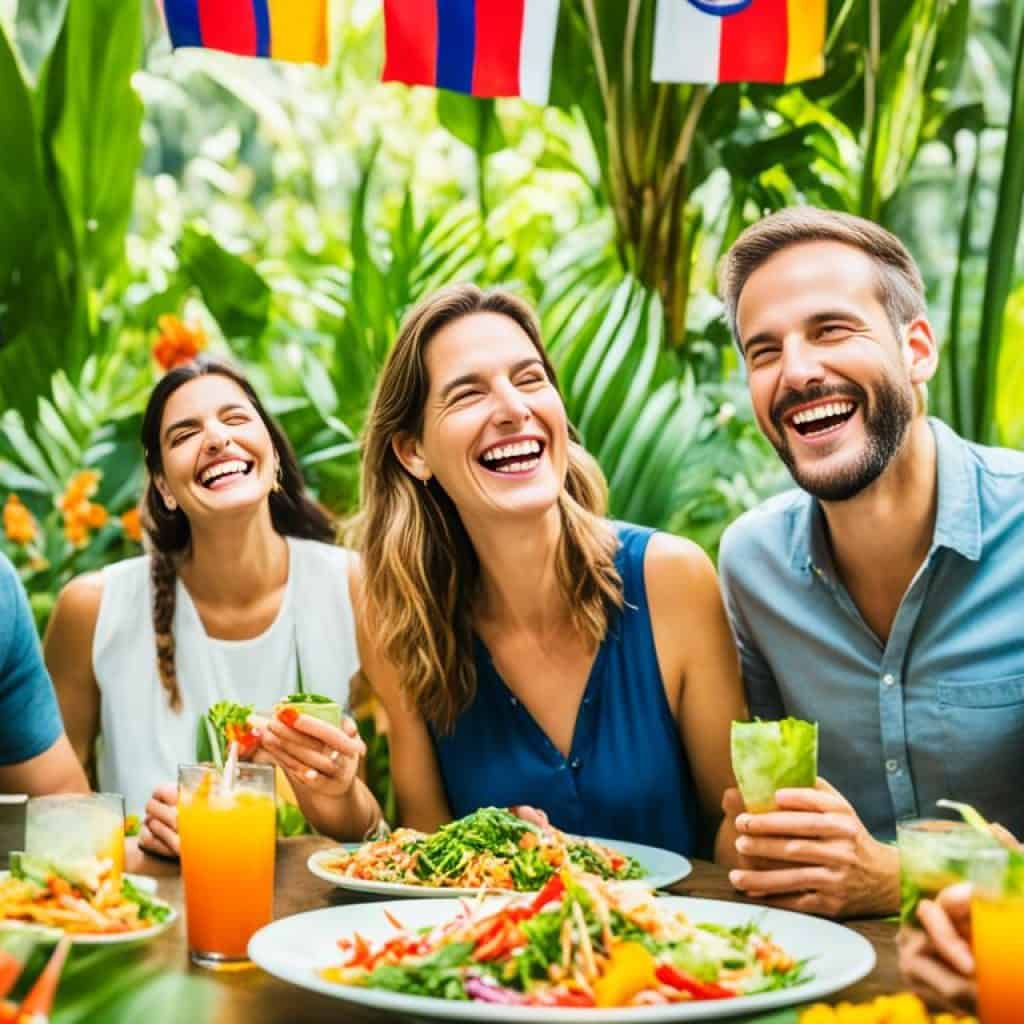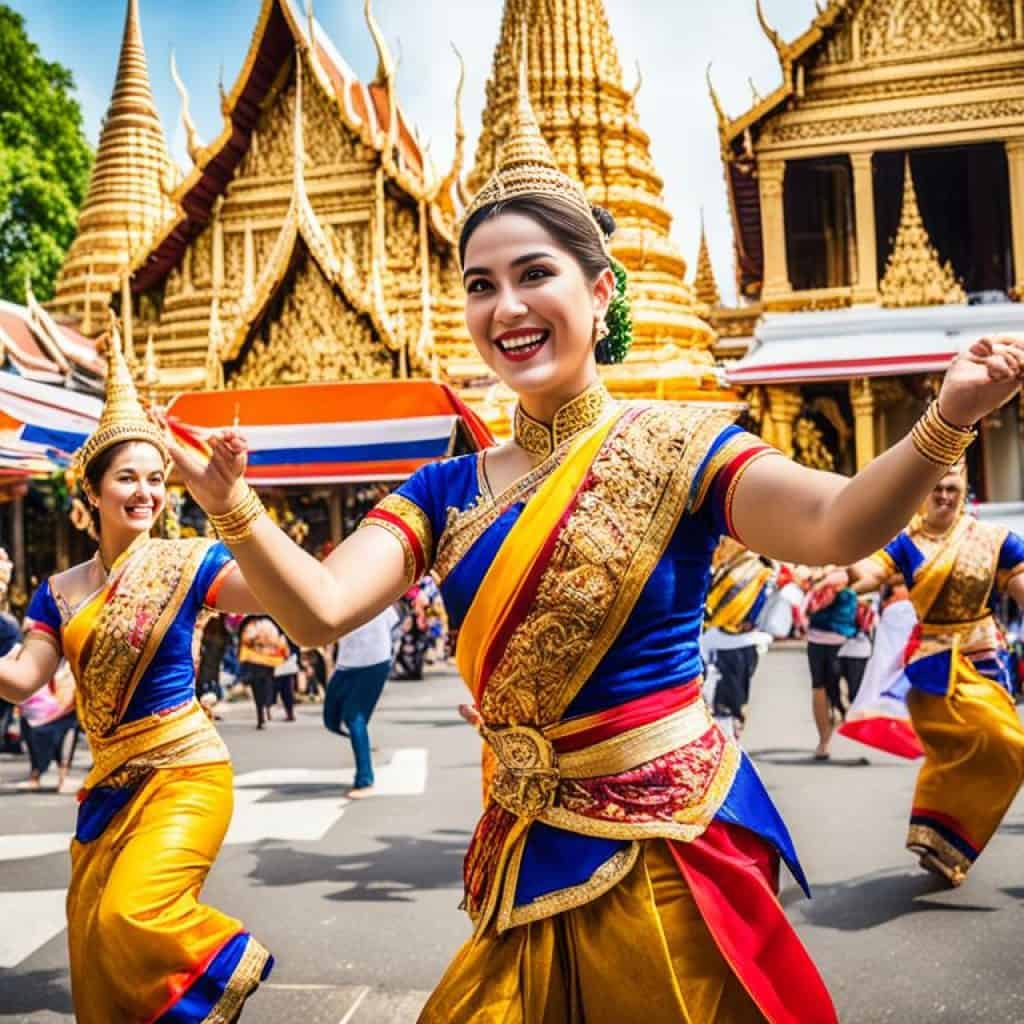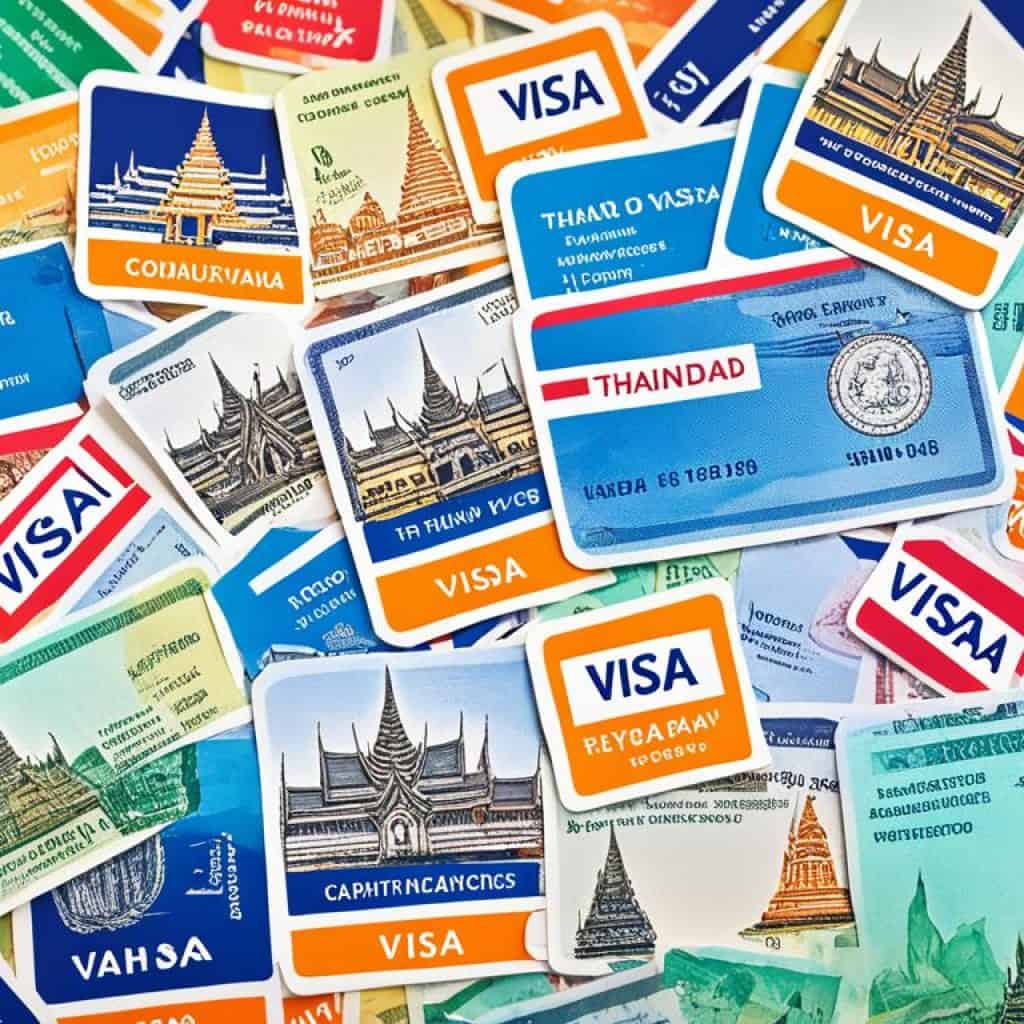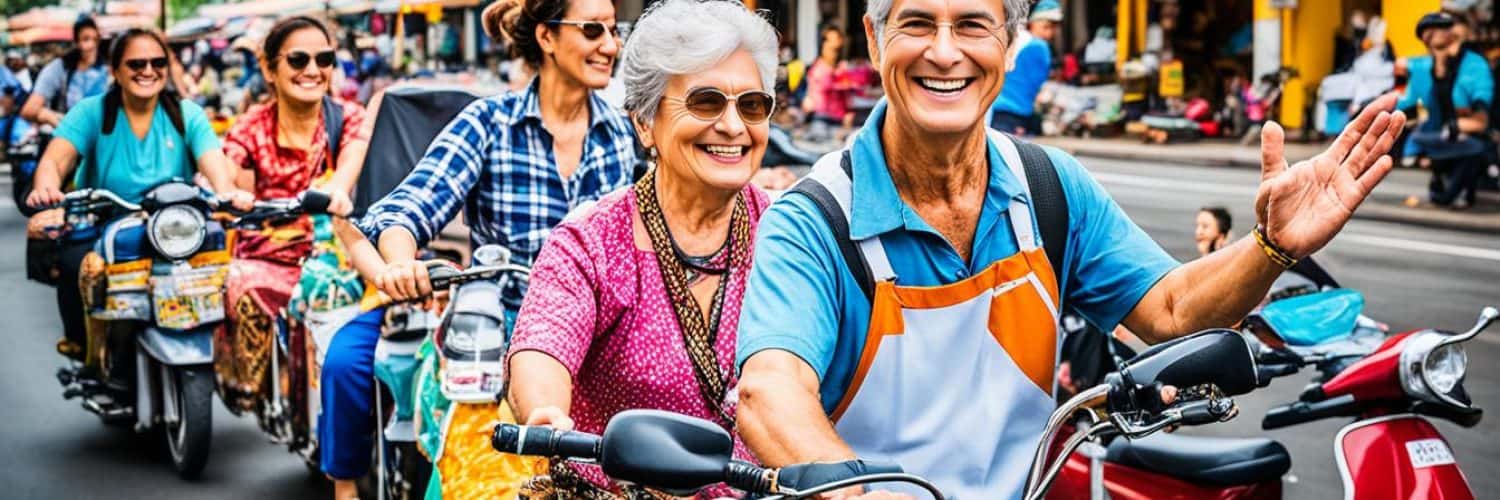Are you dreaming of a new life in a tropical paradise? Look no further than Thailand! With its enchanting culture, affordable cost of living, and welcoming expat community, Thailand offers a truly thriving experience for those seeking an overseas adventure. But how can you navigate and make the most of your expat life in this vibrant country? In this comprehensive guide, we’ll share valuable insights and tips for living as an expat in Thailand, from practical advice to integrating into the local culture. Get ready to embark on an incredible journey in the Land of Smiles!
Key Takeaways:
- Thailand offers a thriving expat community and a host of opportunities for those seeking a new life abroad.
- Embracing the local culture and customs is key to a fulfilling expat experience in Thailand.
- The delicious and diverse Thai cuisine is a highlight of living in Thailand, with vibrant street food stalls and high-end restaurants to explore.
- While learning the Thai language is not essential, mastering the basics can enhance your experience as an expat.
- Adopting the “mai pen rai” attitude of going with the flow can help you navigate the ups and downs of life abroad in Thailand.
The Land of Smiles: Embracing Thai Culture
Thailand, also known as the “Land of Smiles,” is renowned for its friendly and welcoming locals. As an expat in Thailand, immersing yourself in the local culture and customs can greatly enhance your experience and help you feel at home. Embracing Thai customs and traditions is not only a way to show respect but also a gateway to building meaningful connections and creating lasting memories in your new home.
To assist expats in their cultural integration journey, there are numerous valuable resources, guidebooks, and services available. These Thai expat resources and Thailand expat guides offer practical advice, insights into the local customs, and tips for navigating daily life in Thailand. They can provide you with information on everything from Thai language classes to expat support groups, making your transition smoother and more enjoyable.
One of the key aspects of embracing Thai culture is understanding the Thai customs and traditions. Thais place great importance on respect and politeness, which is reflected in their daily interactions and social etiquette. Whether it’s greeting with a “wai” (a traditional Thai gesture of respect), understanding temple etiquette, or knowing how to dress modestly for certain occasions, being aware of these cultural nuances will help you navigate social situations with ease.
“To truly experience the magic of Thailand, embrace its customs and traditions. The welcoming nature of the Thai people and the richness of their culture will open doors to unforgettable experiences and lifelong friendships.”
Furthermore, the Thailand expat community is a valuable resource for expats looking to connect with like-minded individuals, make new friends, and seek support. The expat community in Thailand is diverse and vibrant, with various social groups, clubs, and organizations catering to different interests and hobbies. By joining these communities, you can expand your social circle, gain insider tips, and share experiences with fellow expats.
Thai Customs and Traditions
Thai customs and traditions are deeply rooted in the country’s rich history and religious beliefs. Here are a few key customs to be aware of:
- Respecting elders: Thais place great importance on respecting and honoring their elders. This includes using polite language, not pointing your feet towards them, and showing deference in social interactions.
- Buddhism: Thailand is predominantly Buddhist, and Buddhist traditions have a strong influence on daily life. Temples play a central role in Thai society, and it’s important to dress modestly and remove your shoes before entering.
- Food etiquette: Thai cuisine is renowned worldwide for its vibrant flavors and aromatic spices. When dining with Thais, it’s customary to share dishes and eat family-style. Try to use the spoon to eat, as the fork is usually only used to push food onto the spoon.
By embracing Thai culture and customs, you will not only gain a deeper understanding of the country but also earn the respect and appreciation of the local community. Take the time to learn about Thai customs and traditions, engage with the local culture, and enjoy the enriching experiences that Thailand has to offer.
Becoming a Foodie Adventurer
Indulging in Thai food is an absolute must for expats living in Thailand. The country is renowned for its mouthwatering cuisine, which is filled with bold flavors and unique combinations. Whether you’re a fan of spicy dishes, savory soups, or delectable desserts, Thailand has something to satisfy every palate.
The bustling streets of Thailand are a playground for food lovers, with countless street food stalls and markets offering an array of tantalizing treats. From aromatic Pad Thai noodles to flavorful Tom Yum soup, street food in Thailand is a true culinary adventure. Immerse yourself in the vibrant atmosphere as you explore the diverse street food scene, from the bustling streets of Bangkok to the charming local markets of Chiang Mai.
For those seeking a more refined dining experience, Thailand is home to numerous high-end restaurants that showcase the best of Thai cuisine. These establishments boast elegant settings and innovative menus, offering a fusion of traditional flavors and contemporary techniques. Indulge in signature dishes such as green curry, massaman curry, and mango sticky rice, all expertly prepared to tantalize your taste buds.
“Thai cuisine is a harmonious blend of sweet, sour, spicy, and savory flavors, creating a symphony of tastes that will leave you craving for more.”
Exploring the Vibrant Food Scene
Thailand’s food scene goes beyond the iconic Pad Thai and Tom Yum soup. Each region in Thailand has its own unique culinary specialties, giving you the opportunity to embark on a gastronomic journey across the country.
Here are some must-try dishes from different regions of Thailand:
- Khao Soi – a Northern Thai dish with egg noodles, curry broth, and tender meat
- Som Tum – a Northeastern Thai salad made with green papaya, chili, and lime
- Moo Ping – grilled pork skewers marinated in a flavorful sauce
- Pla Pao – whole grilled fish stuffed with lemongrass, herbs, and spices
From the fiery flavors of Isan cuisine to the rich curries of the South, exploring the diverse range of regional Thai dishes is an exciting culinary adventure.
Tips for Navigating the Local Cuisine
When dining in Thailand, keep the following tips in mind to enhance your foodie experience:
- Be adventurous: Don’t be afraid to try new flavors and dishes. Thai cuisine is known for its bold and unique combinations of ingredients.
- Spice levels: Thai food can be spicy, so be sure to communicate your preferred spice level when ordering.
- Street food safety: To ensure food safety when enjoying street food, look for stalls with a high turnover of customers and follow the locals’ lead.
- Freshness is key: Opt for restaurants and food vendors that prioritize fresh ingredients. This will ensure you enjoy the authentic flavors of Thai cuisine.
- Food tours: Consider joining a food tour led by a local guide. This immersive experience will introduce you to hidden culinary gems and provide valuable insights into Thai food culture.
With its vibrant street food scene, diverse regional specialties, and fusion of flavors, Thai cuisine truly offers a treat for the senses. Embrace your inner foodie adventurer and embark on a tantalizing culinary journey through the Land of Smiles!
Mastering the Thai Language
While living in Thailand as an expat, learning the basics of the Thai language can greatly enhance your experience and open doors to deeper connections with locals. Although fluency is not necessary, being able to communicate in Thai can enrich your day-to-day interactions and make navigating the country easier. In this section, we will provide you with helpful resources and valuable tips to help you master the Thai language.
Essential Phrases for Everyday Conversations
Learning a few key phrases in Thai can go a long way in making a good impression and showing respect to the locals. Here are some essential phrases to get you started:
- Sawasdee ka (Hello)
- Khob khun ka (Thank you)
- Chai/ Mai chai (Yes/ No)
- Nee tao rai? (How much is this?)
- Ho dow roo (I understand)
- Chuay duay (Please help)
Language Learning Tools
To aid your language learning journey, there are several resources and tools available:
- Language Apps: Apps like Duolingo, Memrise, and ThaiPod101 offer interactive lessons and exercises to help you learn Thai at your own pace.
- Language Exchange Meetups: Joining language exchange groups or attending meetups can provide opportunities to practice speaking Thai with locals while also making new friends.
- Online Courses: Websites like Udemy and Coursera offer online Thai language courses taught by experienced instructors.
- Tutoring Services: Hiring a Thai language tutor can provide personalized instruction and guidance tailored to your learning style and needs.
Immerse Yourself in the Thai Language
One of the most effective ways to learn any language is through immersion. Here are some suggestions to immerse yourself in the Thai language:
- Practice with Locals: Engaging in conversations with locals whenever possible can help you improve your Thai speaking skills.
- Watch Thai Movies or TV Shows: Watching Thai movies or TV shows with subtitles can expose you to the language and help you pick up new words and phrases.
- Listen to Thai Music: Listening to Thai music and paying attention to the lyrics can familiarize you with the tones and rhythms of the language.
- Read Thai Books or Magazines: Reading Thai books or magazines, even if it’s initially challenging, can gradually improve your reading comprehension.
Embracing the “Mai Pen Rai” Attitude
When it comes to adapting to Thai culture, embracing the “mai pen rai” attitude is essential for expats in Thailand. This unique Thai mindset is best translated as “it’s okay” or “never mind.” It reflects the relaxed and easy-going nature of the Thai people, providing a foundation for a more fulfilling expat life.
The “mai pen rai” attitude encourages expats to go with the flow and approach challenges with a positive and accepting mindset. It allows for a greater sense of flexibility and adaptability in navigating the ups and downs of life abroad.
As an expat in Thailand, adopting the “mai pen rai” attitude can have numerous benefits. It helps to reduce stress and anxiety, promoting a sense of calm and contentment. By letting go of the need to control every situation, expats can embrace the spontaneity and unpredictability that Thailand offers.
Furthermore, embracing the “mai pen rai” attitude allows expats to better integrate into Thai society. Thai people greatly appreciate foreigners who demonstrate respect for their culture and way of life. By adopting this mindset, expats show their willingness to adapt and embrace Thai customs and traditions.
Ultimately, embracing the “mai pen rai” attitude is a key element in successfully blending into the fabric of Thai society. Expats who go with the flow in Thailand are more likely to form deeper connections with locals, gain valuable insights into Thai culture, and create a more fulfilling expat experience overall.
Quotes:
“The ‘mai pen rai’ attitude is central to Thai culture. It encourages us to let go of unnecessary worries and embrace the present moment. As an expat, adopting this mindset can open doors to amazing experiences and help us truly thrive in Thailand.” – Sarah, expat living in Chiang Mai
“The ‘mai pen rai’ attitude has taught me the beauty of embracing uncertainty. Instead of resisting change, I now see it as an opportunity for growth and personal transformation. It has truly enriched my expat journey in Thailand.” – Michael, expat living in Bangkok
Benefits of Embracing the “Mai Pen Rai” Attitude
| Benefits | Description |
|---|---|
| Reduced Stress | Embracing the “mai pen rai” attitude promotes a sense of calm and reduces stress levels, allowing expats to navigate challenges with greater ease. |
| Integration into Thai Society | Thai people appreciate expats who demonstrate respect for their culture and customs. By embracing the “mai pen rai” attitude, expats show their willingness to adapt and integrate into Thai society. |
| Deeper Connections | Going with the flow in Thailand enables expats to form deeper connections with locals, fostering a stronger sense of community and belonging. |
| Enhanced Expat Experience | By embracing the “mai pen rai” attitude, expats can fully immerse themselves in the Thai way of life, leading to a more authentic and fulfilling expat experience. |

Navigating Bargaining in Thailand
Bargaining is an integral part of the shopping experience in Thailand. Whether you’re exploring bustling markets or browsing street stalls, honing your bargaining skills can lead to incredible deals and a deeper immersion into the local culture. In this section, we will share expert tips and proven strategies that will empower you to master the art of bargaining in Thailand.
Understanding the Basics: Bargaining in Thai Markets
When it comes to bargaining in Thailand, there are a few fundamental principles to keep in mind. Firstly, it’s essential to approach the process with a friendly and respectful attitude. Thai vendors appreciate politeness and a good-natured approach, which can go a long way in securing a favorable price. Secondly, be prepared to negotiate. The initial price quoted is often marked up significantly, and haggling is expected. Finally, patience is key. Bargaining in Thailand can be time-consuming but is ultimately rewarding when you walk away with a fantastic deal.
| Tips for Successful Bargaining |
|---|
| 1. Start with a smile and greet the vendor warmly to establish a friendly rapport. |
| 2. Do your research and get an idea of the item’s approximate value to make an informed offer. |
| 3. Be confident in your negotiation skills and don’t be afraid to counteroffer with a lower price. |
| 4. Use the magic of silence. After making your offer, remain silent and let the vendor respond. |
| 5. Consider bundling. If you’re purchasing multiple items from the same vendor, ask for a package deal. |
| 6. Walk away if the vendor refuses to meet your desired price. In many cases, they may call you back with a lower offer. |
| 7. Remember to stay respectful throughout the negotiation process, even if you don’t reach an agreement. |
By following these tips and adapting to the bargaining culture in Thailand, you’ll be able to navigate the markets with confidence and secure fantastic bargains on unique souvenirs, clothing, accessories, and more.
Embracing the Cultural Aspect: Bargaining as a Local Experience
In addition to helping you snag great deals, bargaining in Thailand offers an opportunity to connect with the locals and experience the vibrant culture firsthand. Engaging in friendly banter, sharing a laugh, and showing genuine interest in the vendor’s goods can create memorable interactions and meaningful connections. As you sharpen your bargaining skills, you’ll not only acquire fantastic items at favorable prices but also create lasting memories of your time in Thailand.
Building a Supportive Expat Community
As an expat in Thailand, building connections with other expats is key to creating a supportive community and making the most of your experience. Joining language exchange meetups, sports clubs, or volunteer organizations can provide opportunities to meet like-minded individuals and forge long-lasting friendships. Not only will these connections help you navigate the challenges of living abroad, but they can also enhance your overall well-being and sense of belonging.
One way to connect with fellow expats is by attending language exchange meetups. These events bring together individuals from various backgrounds who are interested in learning different languages. Participating in language exchange sessions not only allows you to improve your language skills but also provides a chance to meet fellow expats who share your passion for cultural exchange.
Another great way to meet expats is by joining sports clubs or fitness groups. Thailand offers a wide range of outdoor activities, including hiking, yoga, and team sports. By engaging in these activities, you can meet people who share similar interests and enjoy the benefits of a healthy and active lifestyle together.
Volunteering is another excellent way to make connections with both expats and locals while giving back to the community. There are numerous volunteer organizations in Thailand that cater to various causes such as environmental conservation, animal welfare, and education. By joining a volunteer program, you can not only make a positive impact but also meet individuals who are passionate about making a difference.
“Joining language exchange meetups, sports clubs, or volunteer organizations can provide opportunities to meet like-minded individuals and forge long-lasting friendships.”
Building a supportive expat community goes beyond attending events and joining groups. It’s about fostering meaningful connections with individuals who understand the challenges and triumphs of living in a foreign country. Making the effort to reach out and engage in activities with other expats will not only enhance your social life but also provide much-needed support and camaraderie.
| Benefits of Building a Supportive Expat Community |
|---|
| 1. Emotional support during challenging times |
| 2. Advice and guidance on navigating life in Thailand |
| 3. Opportunities for cultural exchange and learning |
| 4. Access to valuable resources and local insights |
| 5. Development of lifelong friendships |
By actively seeking out opportunities to connect with other expats, you’ll find a community that understands and supports you. Embrace the chance to make friends, share experiences, and create memories that will enrich your expat journey in Thailand.
Respecting Thai Customs and Culture
As an expat living in Thailand, understanding and respecting Thai customs and culture is essential. By immersing yourself in the local traditions, you not only show respect for the Thai people but also enhance your experience living in the Land of Smiles.
One important aspect of Thai culture is the practice of removing your shoes before entering a home or temple. This is considered a sign of respect and cleanliness. Take note of others around you and follow their lead when entering someone’s home or a sacred space.
When visiting Buddhist temples, dressing modestly is crucial. Both men and women should cover their shoulders and legs. Wearing loose-fitting clothing in deference to the religious sanctity is highly encouraged.

Thai people value politeness and tend to avoid confrontation. It is considered impolite to raise your voice, point with your foot, or touch someone’s head. Showing respect and maintaining a calm, friendly demeanor will go a long way in building positive relationships with locals.
During your stay in Thailand, you may encounter various cultural practices such as the wai, a traditional greeting. To perform a wai, press your palms together in a prayer-like fashion and bow your head slightly. The higher the hands are held, the more respect is shown. Return a wai when it is offered to you, especially to elders or those in positions of authority.
“Thai culture is rich and diverse, and by respecting and embracing its customs, you’ll deepen your connection with the local community and gain a greater understanding of this beautiful country,” says Sarah, an expat teacher living in Bangkok.
“Thai traditions are deeply rooted in respect and harmony. Taking the time to familiarize yourself with these customs not only shows appreciation for the culture but can also lead to meaningful connections and friendships with Thai locals.”
Remember, as an expat in Thailand, you are a guest in a foreign land. Show respect for Thai customs and traditions, and you’ll find that locals will be more welcoming and accepting of your presence in their country.
Exploring Beyond the Tourist Hotspots
Thailand, with its breathtaking landscapes and vibrant culture, offers an abundance of hidden gems waiting to be discovered. While popular tourist attractions have their charm, venturing off the beaten path can lead to unique experiences that truly capture the essence of this remarkable country.
Whether you are an adventure seeker, a nature lover, or a cultural enthusiast, exploring lesser-known areas of Thailand will reward you with unforgettable memories and a deeper connection to the local culture. From tranquil beaches to picturesque villages and lush national parks, there is a wealth of off-the-beaten-path destinations to choose from.
To help you embark on your journey of exploration, we have curated a list of recommendations and resources for discovering the hidden treasures of Thailand:
- Visit Khao Sok National Park, a pristine rainforest in southern Thailand, where you can embark on unforgettable jungle treks, go canoeing on stunning lakes, and spot exotic wildlife.
- Explore the enchanting province of Mae Hong Son, known for its mountainous landscapes, charming villages, and vibrant hill tribe cultures.
- Discover the ancient city of Sukhothai, a UNESCO World Heritage Site, and immerse yourself in the rich history and architectural wonders of Thailand’s first capital.
- Experience the serenity of Pai, a bohemian town nestled in the mountains of Northern Thailand, renowned for its natural hot springs, waterfalls, and laid-back vibe.
- Indulge in the tranquility of the secluded island of Koh Lipe, where crystal-clear turquoise waters, pristine coral reefs, and white sandy beaches await.
“Traveling off the beaten path allows you to discover the true essence of a destination, away from the crowds and tourist traps. Thailand’s hidden gems offer a chance to connect with nature, immerse yourself in local cultures, and create lifelong memories.”
Exploring off-the-beaten-path destinations in Thailand is as much about the journey as it is about the destination. Embrace the freedom of wandering through uncharted territories, interact with friendly locals, and savor authentic Thai cuisine that may not be found in popular tourist areas.
Resources for Exploring Hidden Treasures
When planning your off-the-beaten-path adventure in Thailand, it’s helpful to have reliable resources at your disposal. Here are some trusted sources to guide you:
| Website | Description |
|---|---|
| Tourism Thailand | Official website of the Tourism Authority of Thailand, featuring comprehensive travel information, guides, and itineraries. |
| Lonely Planet – Thailand | A popular travel guidebook series providing detailed insights into Thailand’s hidden gems, offbeat attractions, and local experiences. |
| Travelfish | An independent travel resource offering in-depth guides, travel tips, and personal experiences for off-the-beaten-path destinations in Thailand. |
Remember, exploring beyond the tourist hotspots requires a sense of curiosity, an open mind, and a willingness to embrace the unexpected. So pack your sense of adventure and get ready to embark on a journey of discovery in off-the-beaten-path Thailand!
Staying Healthy and Safe in Thailand
As an expat in Thailand, staying healthy and safe is of utmost importance. Taking proactive measures and being prepared can help you enjoy a worry-free experience in this incredible country. Here are some essential tips to ensure your well-being:
Vaccinations for Thailand
Prior to your trip, it is essential to check the recommended vaccinations for Thailand. Protect yourself against common health risks by getting vaccinated against diseases such as:
- Hepatitis A and B
- Typhoid
- Tetanus and diphtheria
- Influenza
| Vaccination | Recommended |
|---|---|
| Hepatitis A and B | Yes |
| Typhoid | Yes |
| Tetanus and diphtheria | Yes |
| Influenza | Yes |
Remember to consult with your healthcare provider or visit a travel clinic well in advance to ensure you are up to date with all necessary vaccinations for a safe and healthy stay in Thailand.
Healthcare Options
Thailand has a good healthcare system with modern facilities and qualified medical professionals. It is advisable to have comprehensive travel insurance that covers medical expenses as well as emergency medical evacuation, in case of any unforeseen circumstances. Consider the following healthcare options:
- Private Hospitals: Thailand has excellent private hospitals that offer high-quality healthcare services. These hospitals cater to both Thai residents and expats and provide a wide range of specialties.
- International Clinics: International clinics are another viable option for expats seeking quality healthcare. These clinics are staffed with English-speaking doctors and medical professionals who understand the needs of expatriates.
- Public Hospitals: Public hospitals in Thailand provide affordable healthcare but may have longer waiting times and limited English-speaking staff. They are a good option for non-emergency medical needs.
Travel Insurance in Thailand
Having a comprehensive travel insurance policy is highly recommended to protect yourself against any unforeseen incidents or emergencies during your stay in Thailand. Ensure your policy includes coverage for medical expenses, emergency evacuation, trip cancellation, and personal liability. It is also important to review the policy details and exclusions before purchasing the insurance.
table {
width: 100%;
border-collapse: collapse;
}
th, td {
border: 1px solid #999999;
padding: 8px;
text-align: left;
}
th {
background-color: #f2f2f2;
}
Common Safety Precautions
Thailand is generally a safe country for expats, but it is essential to take certain precautions to ensure your safety:
- Be cautious of your personal belongings and avoid displaying signs of wealth in public.
- Stay informed about the local laws and customs to avoid any misunderstandings.
- Use reliable transportation options and be cautious when traveling alone at night.
- Follow government advisories and stay updated on any current safety concerns.
“Health and safety are paramount when living abroad. Taking the necessary precautions and ensuring you have the right support can go a long way in providing peace of mind during your time in Thailand.” – Expatriate Living Magazine
By prioritizing your health and safety, you can fully enjoy all the wonders Thailand has to offer while minimizing any potential risks. Remember to consult with healthcare professionals, secure travel insurance, and stay informed about safety guidelines in order to have a memorable and worry-free experience.
Continuing to Learn and Grow as an Expat
Living as an expat in Thailand offers a unique opportunity for personal growth and self-discovery. Immersed in a vibrant culture, surrounded by breathtaking landscapes, and interacting with diverse individuals, expats in Thailand have ample chances to expand their horizons and embrace lifelong learning. Whether it’s through language classes, cultural activities, or personal experiences, the journey of personal growth in Thailand is both enriching and transformative.
Learning in Thailand:
Thailand provides a multitude of avenues for expats to pursue their personal and intellectual passions. Language classes, such as Thai language courses, offer a chance to immerse oneself in the local culture, foster connections with locals, and navigate daily life with greater ease. Whether you’re a beginner or in pursuit of fluency, learning the Thai language can open doors to deeper understanding and meaningful connections.
Expat Experiences in Thailand:
Experiencing life as an expat in Thailand cultivates personal growth through unique encounters and challenges. Engaging in expat communities, participating in cultural festivals, and volunteering for local causes foster cultural understanding and appreciation. The camaraderie found among fellow expats provides support and an avenue for shared experiences, enhancing personal growth and resilience.
Living in Thailand has been an incredible journey of personal growth. Embracing the Thai culture, learning the language, and immersing myself in local experiences have expanded my horizons and challenged me in ways I never expected. As an expat in Thailand, every day brings new opportunities for learning and growth, pushing me to embrace my full potential.
Embracing Personal Growth:
To fully embrace personal growth as an expat in Thailand, it’s essential to engage in regular self-reflection. Taking time to assess your experiences, reflect on your personal growth, and set goals for the future ensures a continuous journey of self-improvement. Embrace the challenges and triumphs that come with living abroad, and use every opportunity as a catalyst for personal and professional development.
Opportunities for Personal Growth
Here are some avenues for personal growth and learning in Thailand:
- Language classes: Learn the Thai language to foster deeper connections and understanding.
- Cultural activities: Engage in local festivals, art exhibitions, and traditional performances to immerse yourself in the rich Thai culture.
- Volunteer work: Contribute to the local community through volunteering, fostering personal growth while making a positive impact.
- Skill development: Pursue new hobbies, join clubs, or take up workshops to enhance your skills and broaden your horizons.
- Travel and exploration: Explore Thailand’s diverse landscapes, historical sites, and hidden gems, expanding your knowledge and appreciation of this beautiful country.
Remember, personal growth as an expat in Thailand is a lifelong journey. Embrace the opportunities that come your way, immerse yourself in the local culture, and continue learning and evolving as you navigate your unique expat experience in the Land of Smiles.
Overview of Living in Thailand
Considering a move to Thailand? This section provides a comprehensive overview of what it’s like to live in the Land of Smiles. From the cost of living to accommodation options, transportation systems to weather conditions, we cover all the essential information you need to make informed decisions.
Cost of Living in Thailand
Thailand boasts an affordable cost of living, making it an attractive choice for many expats. Whether you’re a budget-conscious traveler or seeking a luxurious lifestyle, Thailand offers a range of options to suit your preferences. From street food and local markets to international restaurants and upscale shopping centers, there’s something for every budget.
Accommodation in Thailand
Finding suitable accommodation in Thailand is relatively easy. From modern apartments in bustling city centers to tranquil villas near the beach, the country offers a variety of housing options. Whether you prefer to rent or buy, there are plenty of choices available to fit your lifestyle and budget.
Transportation in Thailand
Getting around Thailand is convenient and affordable. The country has a well-developed transportation system that includes buses, trains, taxis, and tuk-tuks. In major cities like Bangkok and Chiang Mai, there’s also the option of using ride-sharing services. Exploring Thailand’s diverse landscapes is made easy with domestic flights and long-distance buses.
Weather in Thailand
Thailand’s climate is tropical, with high temperatures and humidity year-round. The country experiences three seasons: hot season, cool season, and rainy season. The weather can vary depending on the region, with monsoons occurring from May to October. It’s important to be prepared for the weather conditions when planning your activities and packing your luggage.
With a glimpse into the cost of living, accommodation options, transportation systems, and the climate, you are now equipped with valuable information about living in Thailand. This overview will help you navigate your new life in the Land of Smiles with confidence and make the most of your experience as an expat in this diverse and welcoming country.
Expat-Friendly Cities in Thailand
Thailand is home to several popular expat destinations, offering a diverse range of cities and towns to choose from. Whether you’re seeking a bustling metropolis or a tranquil beach town, Thailand has something for everyone. Below, we highlight some of the best cities for expats in Thailand, each with its own unique attractions and expat community:
Bangkok
Bangkok, the vibrant capital of Thailand, is a top choice for many expats. This bustling city offers a mix of modern amenities, rich cultural heritage, and a thriving expat community. From its iconic temples and bustling markets to its world-class dining and nightlife, Bangkok has something to offer everyone. The city’s efficient transport system and international schools make it an ideal destination for expat families.
Chiang Mai
Chiang Mai, located in northern Thailand, is a popular choice for expats seeking a more relaxed and laid-back lifestyle. Known for its beautiful temples, lush mountains, and rich cultural heritage, Chiang Mai offers a unique blend of old-world charm and modern conveniences. The city is home to a large expat community, with numerous social clubs and organizations that offer opportunities for networking and making new friends.
Pattaya
Pattaya, situated on the eastern Gulf coast, is famous for its stunning beaches and vibrant nightlife. This resort city attracts expats from around the world who are drawn to its tropical climate, affordable cost of living, and wide range of recreational activities. Expats in Pattaya can enjoy a variety of water sports, golfing, and dining in international restaurants. The city’s lively expat community ensures a welcoming and supportive environment for those looking to settle here.
Phuket
Phuket, Thailand’s largest island located in the Andaman Sea, offers a mix of beautiful beaches, crystal-clear waters, and a cosmopolitan lifestyle. Expats in Phuket can enjoy a laid-back island lifestyle while still having access to modern amenities and international schools. With a thriving expat community, Phuket offers a range of social events and activities for those looking to connect with other expats.
For a quick visual comparison of these expat-friendly cities in Thailand, refer to the table below:
| City | Attractions | Expat Community |
|---|---|---|
| Bangkok | Iconic temples, vibrant markets, world-class dining and nightlife | Large and diverse expat community |
| Chiang Mai | Beautiful temples, lush mountains, rich cultural heritage | Relaxed and welcoming expat community |
| Pattaya | Stunning beaches, vibrant nightlife, affordable cost of living | Diverse expat community from around the world |
| Phuket | Beautiful beaches, crystal-clear waters, cosmopolitan lifestyle | Welcoming expat community with a range of social events |
Visa Options for Expats in Thailand
As an expat looking to make a long-term stay in Thailand, it’s important to understand the visa options available to you. Thailand offers several visa types designed to accommodate different needs and circumstances. In this section, we will explore two prominent visa options: the Thai Elite Visa and the Long-Term Resident Visa.
Thai Elite Visa
The Thai Elite Visa is an attractive option for expats who wish to enjoy long-term residency privileges in Thailand. This visa offers a range of benefits, including visa-free travel, VIP airport services, and access to elite training and events. The Thai Elite Visa is available in multiple packages, each with its own duration and price point.
Here is an overview of the Thai Elite Visa packages:
| Package | Duration | Price |
|---|---|---|
| Elite Easy Access | 5 years | $15,000 |
| Elite Family Premium | 20 years | $30,000 |
| Elite Ultimate Privilege | Lifetime | $60,000 |
The Thai Elite Visa offers a convenient and hassle-free option for expats seeking a long-term stay in Thailand. However, it’s worth noting that the visa fee is non-refundable, even if you decide to leave before the visa expires.
Long-Term Resident Visa
The Long-Term Resident Visa, also known as the “O-A” visa, is another popular choice for expats looking for a long-term stay in Thailand. This visa is valid for one year and can be renewed annually. It is available to individuals aged 50 years and above.
To qualify for the Long-Term Resident Visa, applicants must meet the following requirements:
- Be 50 years of age or older
- Have no criminal record in Thailand or home country
- Pass a medical examination
- Have proof of adequate finances or a monthly income
Once approved, the Long-Term Resident Visa allows expats to live in Thailand for an extended period, giving them the opportunity to fully immerse themselves in the culture and enjoy the country’s many offerings.
While the Thai Elite Visa and Long-Term Resident Visa are among the most popular options, it’s important to consult with immigration authorities or seek professional advice to determine which visa best suits your specific circumstances.

Embracing Flexibility: Thriving as an Expat in Thailand
Flexibility is a key aspect of thriving as an expat in Thailand. The country offers a wide range of lifestyle options, catering to different budgets and preferences. Whether you choose to live a simple and frugal life or indulge in luxury experiences, Thailand has something for everyone.
Embracing the flexibility and diversity of Thailand opens doors to diverse experiences and opportunities. From exploring bustling city streets to immersing yourself in tranquil natural landscapes, the country offers a myriad of adventures waiting to be discovered.
Living an adaptable lifestyle in Thailand allows you to shape your experience according to your needs and desires. Whether you’re seeking a laid-back beachside vibe or the excitement of urban living, Thailand has diverse locations to suit your preferences.
Thailand’s vibrant food scene is another aspect of its adaptable lifestyle. From street food vendors offering delicious and affordable meals to high-end restaurants serving culinary masterpieces, you can savor a variety of flavors and cuisines.
To truly embrace flexibility, take the time to explore the local culture and traditions. Engage with the friendly locals, participate in festivals, and learn about Thai customs. This cultural immersion adds depth to your expat experience and enriches your understanding of the country.
“Living in Thailand has allowed me to embrace a flexible lifestyle like never before. From the bustling streets of Bangkok to the peaceful islands of the south, every day brings new adventures and possibilities.” – Jane Smith, Expat in Thailand
Conclusion
Living as an expat in Thailand is an incredible opportunity to embrace a unique and rewarding experience. Throughout this comprehensive guide, we have provided valuable insights and tips for thriving in your expat life in Thailand. From immersing yourself in the vibrant local culture to building a strong support network within the expat community, this guide has equipped you with the knowledge and resources to make the most of your time in the Land of Smiles.
By adopting the right mindset and making necessary preparations, you can truly thrive as an expat in Thailand. Embrace the Thai customs and traditions, utilize the expat-friendly resources available, and prepare yourself for a diverse and fulfilling lifestyle. Whether you are seeking the bustling city life of Bangkok or the serene beauty of Chiang Mai, Thailand has something to offer for every expat.
With our expat Thailand tips, you can navigate the challenges and make the most of your experience living abroad in Thailand. Remember, flexibility and openness to new experiences will be your greatest assets as you embark on this exciting journey. Embrace the opportunities to learn, explore, and grow as you create your own unique expat story in Thailand. The Land of Smiles awaits you.
FAQ
What resources are available for expats living in Thailand?
There are various resources available for expats in Thailand, including guidebooks, expat services, and online communities. These resources can provide valuable information and support for expats navigating life in Thailand.
How can I embrace Thai customs and culture as an expat?
Embracing Thai customs and culture involves learning about local traditions, respecting cultural etiquette, and integrating into the community. Utilizing resources such as guidebooks and attending cultural events can assist you in embracing Thai culture.
What should I know about Thai cuisine as an expat?
Thai cuisine is diverse and delicious, with a wide range of flavors and dishes to explore. It’s recommended to try street food stalls and local restaurants to experience the authentic flavors of Thai cuisine.
How can I learn the basics of the Thai language?
Learning the basics of the Thai language can greatly enhance your expat experience. Utilize language learning resources, take language classes, or practice speaking with locals to improve your language skills.
What is the “mai pen rai” attitude and how can I embrace it?
The “mai pen rai” attitude reflects the relaxed and easy-going nature of the Thai people. Embracing this mindset involves being flexible, going with the flow, and accepting situations with a positive outlook.
How can I successfully bargain in Thailand?
Bargaining is common in Thailand, particularly in markets and street stalls. To negotiate the best deals, it’s helpful to research prices, be polite, and be prepared to walk away if an agreement cannot be reached.
How can I build connections with other expats in Thailand?
Joining language exchange meetups, sports clubs, and volunteer organizations can help you connect with other expats in Thailand. Online expat communities and social media groups can also be valuable platforms for making connections.
What should I know about Thai customs and cultural etiquette?
It’s important to respect Thai customs and cultural etiquette. This includes removing your shoes before entering homes or temples, dressing modestly when visiting sacred sites, and being mindful of proper greetings and gestures.
What are some hidden treasures of Thailand to explore?
Thailand has many hidden gems beyond the typical tourist hotspots. Venturing off the beaten path can lead to discovering secluded beaches, historical sites, and picturesque villages that offer unique and unforgettable experiences.
How can I stay healthy and safe while living in Thailand?
How can I continue to learn and grow as an expat in Thailand?
Thailand offers a range of opportunities for learning and personal growth. Taking language classes, participating in cultural activities, and reflecting on your expat experience can contribute to ongoing learning and growth during your time in Thailand.
What should I know about living in Thailand?
Living in Thailand involves considerations such as the cost of living, accommodation options, transportation systems, and the climate. Understanding these aspects can help you make informed decisions and adjust to life in Thailand.
Which cities in Thailand are popular among expats?
Bangkok, Chiang Mai, Pattaya, and Phuket are among the most expat-friendly cities in Thailand. Each of these cities has its own unique attractions and expat communities that cater to various interests and lifestyles.
What visa options are available for expats in Thailand?
How can I embrace flexibility as an expat in Thailand?
Thailand offers a range of lifestyle options, from budget living to luxury experiences. Embracing flexibility involves adapting to different living conditions, exploring diverse opportunities, and being open to new experiences during your time as an expat in Thailand.


















Add comment